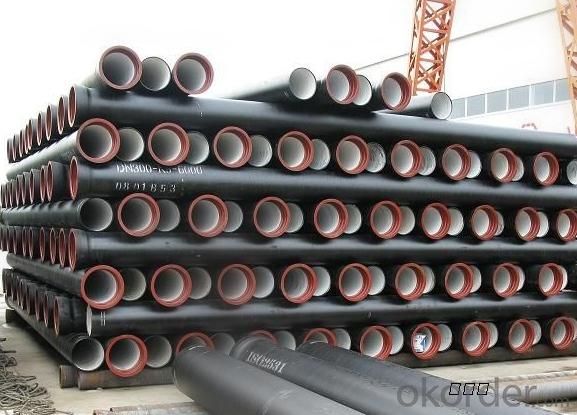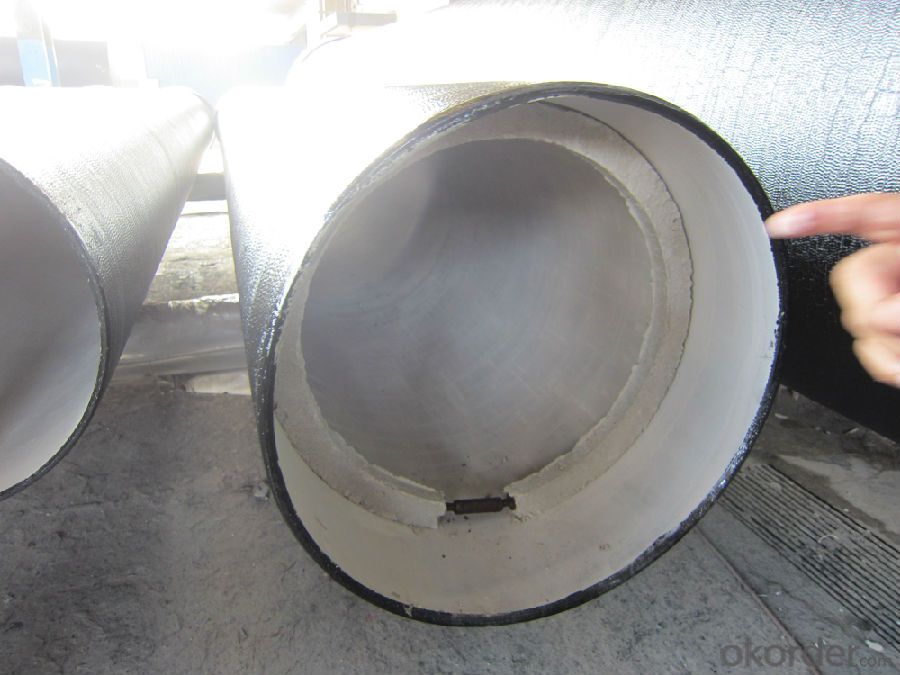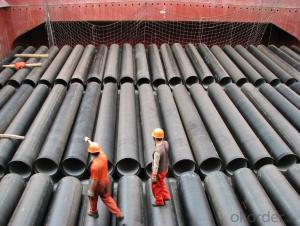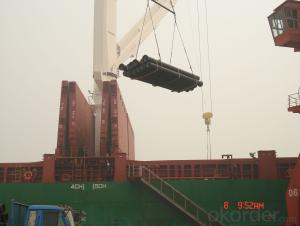Ductile Iron Pipe DN80-DN1000 K9 EN545
- Loading Port:
- China main port
- Payment Terms:
- TT or LC
- Min Order Qty:
- 23 m.t.
- Supply Capability:
- 200000 m.t./month
OKorder Service Pledge
OKorder Financial Service
You Might Also Like
1,Ductile Iron Pipe Description :
1) Pipes confirm to ISO2531,K9 class,T type joint,6m long,with inside cements lining conform to ISO4179, outside Zinc spraying(130g/m2) and bitumen coating(70μm) conform to ISO8179.
2) Pipe ends: Spigot and socket ends, with 100% SBR rubber gaskets accoding to ISO4633
3) we can do third party inspection according to customer's request.
2,Main Features of the Ductile Iron Pipe:
1. Material: Ductile iron grade 500-7/ 450-10 in accordance with ISO1083
2. Standard: ISO 2531, EN545, EN598, ANSI, AWWA
3. Certificate: ISO9001, ISO14001, SGS, NSF, WRAS
4. Test: In accordance with ISO 2531 / EN 545 / EN598 and 100% water pressure test
5. Length: 6m or cut into 5.6m, 5.7m, 5.8m
6. Internal Lining: Cement, conform to ISO4179
7. External coating: Zinc + Bitumen, conform to ISO8179
8. Rubber: NBR, SBR, EPDM according to ISO4633 / EN681.1
9. Note: The gaskets, bolts & nuts are supplied respectively as your special requirement
10Packing and Shipping:standard export package(carton/wooden case/pallet)
accept FOB,FAS,CNF,CIF door to door etc or customer designated shipping agent
11.Service:Drawing: we can translate your original drawing, offer best suggestion on design
Quality: we have full set quality control system to guarantee the best quality.
Inspection: inspect in house, all our products must be checked 3 times before packing
3,Ductile Iron Pipe Images:


4. Ductile Iron Pipe Specification:
Surface Finishes: Bare, Oiled, Mill Varnish, Galv,FBE, FBE Dual, 3LPE, 3LPP, Coal Tar,Concrete Coating and Tape Wrap
End Finishes: Beveled, Square Cut, Threaded, hat
Additional Services: Internal Coating
Packaging: packed in bag, plastic bag, steel strip, steel wire,double wire, iron box, wooden box, tarpaulin, plastic sheeting
Test: X-ray, UT, magnetic particle,inspection,hydrostatic test.
Processing service: Beveling, Threading, Slotting, Cut-to length, Bends, Quench and Temper, Fabrication, Double-jointing and On-site assistance
Documentary: MTC, material certification,Origin certification, CI or PI,Test Report, export licence, handling order, B/L,insurance policy,shipping instructions, contract, packing list etc.
5.FAQ:
We have organized several common questions for our clients,may help you sincerely:
1.Q: Why would you choose ductile iron pipe rather than other pipe materials?
A:The reasons are obvious for that not only ductile iron pipe possesses the inherent strength and flexibility of ductile iron, combined with proven corrosion protection systems, but also the cost savings can be achieved from design to installation and commissioning.
2.Q:Why can you guarantee the inner of pipes can’t be corroded?
A: High alumina cement mortar lining and sulphate-resistant cement mortar lining. These two special linings are applicable to inner anti-corrosion for sewage pipes, improving resistance to erosion of the sewage components.
- Q:Are ductile iron pipes suitable for installation in areas with high seismic activity?
- Areas with high seismic activity are well-suited for the installation of ductile iron pipes. Their ability to withstand external loads and ground movement is a key advantage, making them ideal for seismic zones. In fact, these pipes possess excellent flexibility and high tensile strength, enabling them to endure ground shifting and seismic forces without breaking or fracturing. Additionally, their high resistance to impact and stress decreases their vulnerability to damage during seismic events. Furthermore, the performance of ductile iron pipes in seismic areas has been extensively demonstrated. They have been successfully implemented and utilized in earthquake-prone regions worldwide for numerous years, showcasing their capacity to endure ground movements caused by seismic activity without jeopardizing their structural integrity. Moreover, ductile iron pipes offer the added benefit of being highly durable and long-lasting, which is vital in high seismic areas where infrastructure must withstand frequent ground movements. Their extended lifespan reduces the necessity for frequent maintenance and replacement, resulting in a cost-effective option in the long term. However, it is crucial to note that proper installation techniques and adherence to seismic design guidelines are imperative to ensure optimal performance of ductile iron pipes in high seismic areas. Consulting experienced engineers and adhering to local building codes and regulations is recommended to guarantee correct installation and the ability to withstand the specific seismic conditions of the area. Overall, due to their flexibility, strength, durability, and proven performance, ductile iron pipes are regarded as a suitable choice for installation in areas with high seismic activity.
- Q:How many degrees can the ductile iron pipe be each?
- Minimum tensile strength: 420/Mpa, minimum yield strength: 300/Mpa, minimum elongation 7%.
- Q:Can ductile iron pipe be used for wastewater treatment plants?
- Yes, ductile iron pipe can be used for wastewater treatment plants. Its durability, corrosion resistance, and high strength make it a suitable choice for handling the harsh and corrosive environment of wastewater treatment processes. Additionally, ductile iron pipes can withstand high operating pressures and provide long-term reliability, making them an ideal option for transporting wastewater within the treatment plant.
- Q:What is the typical pressure rating of ductile iron pipes?
- The typical pressure rating of ductile iron pipes ranges from 150 to 350 PSI (pounds per square inch), depending on the diameter and class of the pipe.
- Q:What is the expected joint deflection of ductile iron pipes?
- The expected joint deflection of ductile iron pipes depends on various factors such as the diameter of the pipe, the type of joint used, and the specific conditions of the installation. In general, ductile iron pipes are designed to accommodate some degree of deflection at the joints to allow for flexibility and movement. The American Water Works Association (AWWA) provides guidelines for the maximum allowable joint deflection for ductile iron pipes. According to AWWA C151/A21.51, the maximum deflection at the joint should typically not exceed 3 degrees or 1% of the nominal pipe diameter, whichever is greater. It is important to note that joint deflection should be within the specified limits to ensure the structural integrity and performance of the pipeline system. Excessive joint deflection can lead to leaks, failures, and reduced lifespan of the pipes. To determine the exact expected joint deflection for a specific installation, it is best to refer to the manufacturer's specifications and guidelines, as they may vary depending on the pipe size, joint type, and other factors. Consulting with a qualified engineer or contacting the manufacturer directly can provide more accurate information tailored to the specific project requirements.
- Q:Can ductile iron pipes be used for underground slurry pipelines?
- Yes, ductile iron pipes can be used for underground slurry pipelines. Ductile iron pipes are known for their strength, durability, and resistance to corrosion, making them suitable for a variety of applications including underground slurry pipelines. They provide a reliable and cost-effective solution for transporting slurry, which is a mixture of solids and liquids, over long distances. The inherent toughness and flexibility of ductile iron pipes allow them to withstand the abrasive nature of slurry and the external loads associated with underground installation. Additionally, ductile iron pipes can be easily joined using various methods, ensuring a secure and leak-free pipeline system. However, it is important to consider the specific properties of the slurry being transported and consult with experts to determine the appropriate pipe specifications and design considerations for the underground slurry pipeline.
- Q:What are the different joint types available for ductile iron pipe?
- Ductile iron pipes offer a range of joint types, each with its own benefits and uses. The most commonly employed joint types in ductile iron pipe installations include: 1. Push-on Joint: This type involves inserting a rubber gasket into a groove on the pipe's spigot end. The pipe is then pushed into the bell end of the adjacent pipe, creating a watertight seal. Push-on joints are known for their quick and easy installation, making them perfect for applications that require efficiency. 2. Mechanical Joint: This joint relies on a gland and follower gasket, which are compressed between the spigot end of one pipe and the bell end of another. Bolts and nuts are used to secure the joint, ensuring a tight and secure connection. Mechanical joints provide excellent integrity and are used in applications with higher pressures or heavy loads. 3. Flanged Joint: Flanged joints utilize flanges on the pipe ends, which are bolted together with gaskets to achieve a leak-proof connection. These joints are commonly employed in situations where pipes need to be easily disconnected and reconnected, such as pump stations or valve connections. 4. Restrained Joint: These joints are specifically designed to prevent pipes from separating under high internal pressures or external forces. They typically incorporate mechanical joints with additional restraining devices like harnesses, rods, or thrust blocks. Restrained joints are commonly used in applications where pipe movement poses a risk or stability is crucial. It is important to consider factors like the application, operating conditions, and project requirements when selecting a joint type. Consulting a professional engineer or pipe manufacturer is advisable to ensure the most suitable joint type is chosen for a specific ductile iron pipe installation.
- Q:Can ductile iron pipes be used in areas with high levels of organic matter in soil?
- Yes, ductile iron pipes can be used in areas with high levels of organic matter in soil. Ductile iron pipes have excellent corrosion resistance, making them suitable for various soil conditions, including those with high levels of organic matter. They are resistant to chemical attacks and offer long-term durability, making them a reliable choice for such environments.
- Q:Can cast iron pipes not be used for domestic water supply and drainage?
- Cast iron pipes are mostly used in fire fighting, fire hydrant water supply and indoor water supply. Plastic pipes are used in general and high water riser pipes are made of plastic steel composite pipes
- Q:Can ductile iron pipe be used for nuclear power plants?
- Certain applications within nuclear power plants can utilize ductile iron pipe. Ductile iron pipe is renowned for its strength, durability, and resistance to corrosion, which makes it suitable for a variety of industrial and infrastructure projects. However, when considering nuclear power plants, specific factors must be taken into account. Safety and reliability of materials used in nuclear power plants are of utmost concern. Although ductile iron pipe meets many requirements, it may not be the optimal choice for critical applications involving the transportation of radioactive fluids or the handling of high-pressure or high-temperature systems within the plant. These particular applications often necessitate materials with exceptional resistance to corrosion, stress, and radiation damage. Materials such as stainless steel, nickel alloys, or even specialized materials like Inconel are commonly employed in nuclear power plants due to their superior properties. These materials offer enhanced resistance to radiation-induced embrittlement, corrosion, and high-temperature and high-pressure conditions. Therefore, while ductile iron pipe may find utility in non-critical applications within nuclear power plants, it is crucial to consult industry experts, engineers, and adhere to relevant nuclear safety regulations in order to determine the most suitable materials for specific applications within the plant.
1. Manufacturer Overview |
|
|---|---|
| Location | |
| Year Established | |
| Annual Output Value | |
| Main Markets | |
| Company Certifications | |
2. Manufacturer Certificates |
|
|---|---|
| a) Certification Name | |
| Range | |
| Reference | |
| Validity Period | |
3. Manufacturer Capability |
|
|---|---|
| a)Trade Capacity | |
| Nearest Port | |
| Export Percentage | |
| No.of Employees in Trade Department | |
| Language Spoken: | |
| b)Factory Information | |
| Factory Size: | |
| No. of Production Lines | |
| Contract Manufacturing | |
| Product Price Range | |
Send your message to us
Ductile Iron Pipe DN80-DN1000 K9 EN545
- Loading Port:
- China main port
- Payment Terms:
- TT or LC
- Min Order Qty:
- 23 m.t.
- Supply Capability:
- 200000 m.t./month
OKorder Service Pledge
OKorder Financial Service
Similar products
New products
Hot products
Related keywords


























